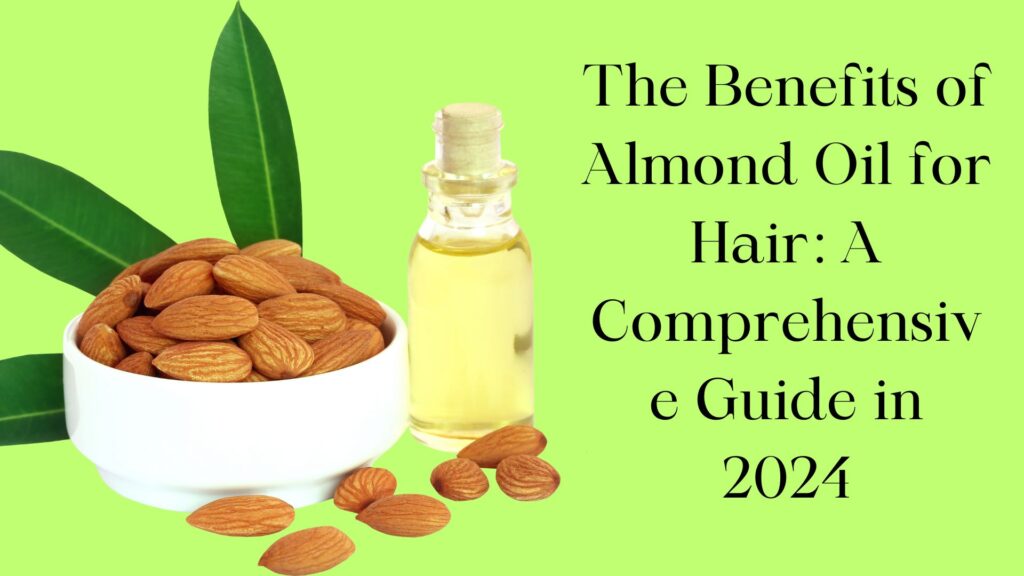Introduction
Almond oil, extracted from the kernels of sweet almonds, has been a beauty staple for centuries. Renowned for its nourishing properties, this natural oil is packed with vitamins, minerals, and antioxidants that promote hair health. In this comprehensive guide, we’ll explore the benefits of almond oil for hair, delve into its nutritional profile, and provide tips on how to incorporate it into your hair care routine.
What is Almond Oil?
Almond oil is derived from the seeds of the almond tree (Prunus dulcis). There are two kinds of almond oil: sweet and unpleasant. Sweet almond oil is the type most commonly used in beauty and personal care products due to its rich nutrient content and mild nature. It is a carrier oil, meaning it can be used on its own or mixed with essential oils to enhance its effects.
Nutritional Profile of Almond Oil
Almond oil is rich in:
Vitamins: Especially Vitamin E, a powerful antioxidant that protects hair from environmental stressors.
Fatty Acids: Including oleic acid (omega-9) and linoleic acid (omega-6), which help to nourish and moisturize the hair and scalp.
Minerals: Such as magnesium, calcium, and zinc, which support hair growth and scalp health.
Proteins: That help in strengthening hair and repairing damage.
The Benefits of Almond Oil for Hair
1. Moisturizes and Conditions Hair
Almond oil is an excellent emollient, which means it helps to soften and smooth the hair. The high content of essential fatty acids in almond oil helps to lock in moisture, making it an ideal natural conditioner. Regular use of almond oil can make hair softer, shinier, and more manageable.
How to Use:
Warm a few tablespoons of almond oil.
Apply it to your scalp and hair, zeroing in on the closures.
Leave it on for something like 30 minutes prior to cleaning it out with a delicate cleanser.
2. Promotes Hair Growth
Magnesium and zinc, both found in almond oil, play crucial roles in hair growth. Magnesium helps to maintain a healthy scalp by promoting blood circulation, while zinc helps to repair damaged hair follicles, which can stimulate new growth.
How to Use:
Mix a few drops of almond oil with essential oils like rosemary or peppermint oil.
Massage the mixture into your scalp to enhance blood flow and stimulate hair follicles.
3. Reduces Dandruff and Scalp Inflammation
Almond oil has anti-inflammatory properties that can help soothe an irritated scalp. Its moisturizing effects can also reduce the flakiness associated with dandruff, providing relief from itching and dryness.
How to Use:
Mix almond oil with tea tree oil, known for its antifungal properties.
Massage the mixture into your scalp and leave it on for 20 minutes before washing your hair.
4. Prevents Hair Loss
Hair loss can result from various factors, including poor nutrition, stress, and scalp infections. The nutrients in almond oil, such as vitamin E and fatty acids, strengthen hair at the roots, reducing the likelihood of hair breakage and loss.
How to Use:
Regularly massage almond oil into your scalp to nourish hair follicles.
Combine with other hair-strengthening oils like castor oil for added benefits.
5. Repairs Hair Damage
Almond oil can help repair damage caused by heat styling, chemical treatments, and environmental factors. Its high protein content aids in repairing hair structure, making it less prone to breakage and split ends.
How to Use:
Apply a generous amount of almond oil to damaged hair.
Cover your hair with a shower cap and leave it on short-term.
Wash your hair toward the beginning of the day with a gentle cleanser.
6. Improves Hair Texture
Using almond oil regularly can improve the overall texture of your hair, making it smoother and less prone to frizz. The oil penetrates deep into the hair shaft, providing essential nutrients and moisture that improve hair elasticity and strength.
How to Use:
Use almond oil as a leave-in conditioner.
Apply a modest quantity to the closures of your hair to tame frizz and add sparkle.
7. Protects Hair from Sun Damage
The antioxidant properties of almond oil, particularly due to its high vitamin E content, help protect hair from the damaging effects of UV radiation and environmental pollutants.
How to Use:
Apply a small amount of almond oil to your hair before heading out in the sun.
Combine with other protective oils like coconut or argon oil for enhanced sun protection.
8. Adds Shine and Lustre
The emollient nature of almond oil helps to fill in gaps in your hair at a cellular level, making it feel smoother to the touch and giving it a healthy shine.This is especially helpful for dull, dead hair.
How to Use:
After washing your hair, apply a few drops of almond oil to damp hair.
Style as usual to enjoy added shine and smoothness.
How to Choose the Right Almond Oil
When selecting almond oil for hair care, it’s important to choose a high-quality product to ensure you get the maximum benefits. Here are some tips:
Cold-Pressed: Look for cold-pressed almond oil, as this method of extraction retains more nutrients compared to heat extraction.
Pure and Organic: Choose 100% pure and organic almond oil to avoid exposure to pesticides and other harmful chemicals.
Packaging: Almond oil should be stored in dark glass bottles to protect it from light, which can degrade its quality.
DIY Hair Treatments with Almond Oil
Incorporating almond oil into your hair care routine can be simple and effective. Here are some DIY treatments you can try at home:
1. Almond Oil Hair Mask for Deep Conditioning
Ingredients:
– 2 tablespoons of almond oil
– 1 tablespoon of honey
– 1 egg yolk
Instructions:
1. Blend every one of the fixings in a bowl until very much consolidated.
2. Apply the blend to soggy hair, zeroing in on the finishes.
3. Leave it on for 30-45 minutes.
4. Rinse thoroughly with lukewarm water and shampoo.
2. Scalp Treatment for Dandruff
Ingredients:
– 2 tablespoons of almond oil
– 5 drops of tea tree oil
Instructions:
1. Mix the oils in a small bowl.
2. Massage the mixture into your scalp using circular motions.
3. Leave it on for 20 minutes.
4. Wash your hair with a gentle cleanser.
3. Leave-In Conditioner for Shine
Ingredients:
– 1 tablespoon of almond oil
– 2 tablespoons of aloe vera gel
Instructions:
1. Mix the almond oil and aloe vera gel in a bowl.
2. Apply a small amount to the ends of damp hair.
3. Style as usual.
Conclusion
Almond oil is a versatile and powerful natural remedy for various hair issues. Its rich nutrient profile, combined with its moisturizing and protective properties, makes it an excellent choice for maintaining healthy, beautiful hair. Whether you’re dealing with dryness, dandruff, or hair loss, incorporating almond oil into your hair care routine can yield impressive results. By choosing high-quality almond oil and using it regularly, you can enjoy stronger, shinier, and more manageable hair.
Incorporate almond oil into your hair care regimen today and experience the transformative benefits of this natural wonder.
Frequently Asked Questions (FAQ) About Almond Oil for Hair
1. What are the main benefits of using almond oil on hair?
Answer: Almond oil moisturizes and conditions hair, promotes hair growth, reduces dandruff and scalp inflammation, prevents hair loss, repairs hair damage, improves hair texture, protects hair from sun damage, and adds shine and lustre.
2. How frequently would it be advisable for me to utilise almond oil on my hair?
Answer: For optimal results, it’s recommended to use almond oil 2-3 times a week. Be that as it may, you can change the recurrence in light of your hair type and needs.
3. Can almond oil help with hair loss?
Answer: Yes, almond oil can help reduce hair loss. Its nutrient-rich composition strengthens hair at the roots, reduces breakage, and promotes healthier hair growth.
4. Is almond oil suitable for all hair types?
Answer: Yes, almond oil is suitable for all hair types, including dry, oily, and normal hair. Its lightweight texture makes it an excellent choice for both fine and thick hair.
5. Could I at any point leave almond oil in my hair short-term?
Answer: Yes, leaving almond oil in your hair overnight allows it to deeply penetrate and nourish the hair and scalp. Just make sure to cover your hair with a shower cap or towel to avoid staining your pillow.
6. How do I use almond oil to treat dandruff?
Answer: Mix almond oil with tea tree oil and massage it into your scalp. Leave it on for about 20 minutes before washing your hair with a gentle shampoo. This treatment helps reduce flakiness and soothes an irritated scalp.
7. Can I mix almond oil with other oils?
Answer: Absolutely. Almond oil can be mixed with other oils like coconut oil, argan oil, castor oil, and essential oils such as rosemary or peppermint oil to enhance its benefits for hair.
8. How do I choose the best almond oil for my hair?
Answer: Look for cold-pressed, 100% pure, and organic almond oil. It should be stored in dark glass bottles to protect it from light and maintain its quality.
9. Are there any side effects of using almond oil on hair?
Answer: Almond oil is generally safe for most people. However, if you have a nut allergy, you should avoid using it. Always perform a patch test before using it extensively to ensure you don’t have any allergic reactions.
10. Can almond oil help with split ends?
Answer: Yes, the moisturizing and strengthening properties of almond oil can help reduce the appearance of split ends and prevent further damage.



